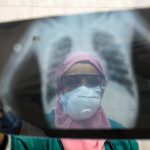Since the beginning of the COVID-19 outbreak in Egypt, Egyptian authorities have waged a campaign of intimidation, harassment, and detention against medical professionals who have spoken out about the government’s inadequate response to the pandemic. Egypt’s National Security Agency has detained at least 10 health care workers for voicing concerns over insufficient personal protective equipment, a lack of testing and infection control measures, overcrowded hospitals, and other criticisms of the government’s handling of the COVID-19 crisis.
The Egyptian state has accused these health workers of “spreading false news,” “misusing social media,” and “membership in a terrorist group.” A recent Amnesty International report highlighted the case of 26-year-old Dr. Alaa Shaaban Hamida, who remains in pre-trial detention after a colleague used her phone to report a suspected coronavirus case directly to the Health Ministry. Other health workers have been indicted merely for critical posts on social media.
While praising its “heroic” health workers in public, the Egyptian government has demanded that they go about their work in silence, risking their lives in unsafe conditions.
These arrests and prosecutions are part of a broader crackdown against those who criticize the government’s COVID-19 response. Egypt has arrested at least 500 people for challenging the government’s optimistic narrative, according to Gamal Eid, director of the Arab Network for Human Rights. Many of those targeted have been journalists, lawyers, and nurses and doctors working on the front lines.
While praising its “heroic” health workers in public, the Egyptian government has demanded that they go about their work in silence, risking their lives in unsafe conditions. A letter from the Egyptian Health Ministry, distributed to hospital staff in Behira province, warned health workers not to leak information regarding the epidemic; another, signed by the North Sinai governor, threatened those considering quitting or going on strike. Workers who have broken this strict vow of silence have been transferred to isolation hospitals or to hospitals in distant governorates, far from their families and their homes.
At the same time, doctors’ pleas for more resources and increased support have been met largely with silence or denial by the Egyptian Health Ministry. In a May 25 statement, the Egyptian Medical Syndicate (EMS) accused the Ministry of Health of repeatedly failing in its duty to protect medical staff and held the ministry responsible for the deaths of several frontline medical workers, including 32-year-old Dr. Walid Yahya, who died of COVID-19 after he was denied a bed at a quarantine hospital in Cairo. Health Minister Hala Zayed rebuffed these complaints, accusing the EMS of exaggerating the doctors’ death count and insisting that her ministry had provided “sufficient stocks” of protective gear to health workers.
President Abdel Fatteh el-Sisi himself has threatened those who “question the state’s efforts and achievements,” to counter the pandemic, deeming them “enemies of the state.” In an often-used tactic for stifling dissent, Sisi’s government and its supporters have accused the EMS of involvement with the Muslim Brotherhood. Pro-government media outlets continue to brand doctors and members of the EMS as terrorists, traitors, and agents of foreign countries.
Just as the Egyptian government celebrated a national reopening of services and sporting events in early July, claiming victory over the virus, Egyptian hospitals were being hit harder than ever. While the country seemed initially to have avoided a massive coronavirus outbreak, the virus spread began to accelerate rapidly at the start of the summer, with around 1,500 new cases recorded daily by the end of June. A record number of single-day deaths from COVID-19 was recorded on June 15, weeks after the Egyptian Medical Syndicate warned of the potential collapse of the entire medical system. Now, with a resurgence in cases since the beginning of August, Egyptian doctors fear a second wave of the Coronavirus will soon shake the nation.
As of August 10th, the Egyptian government recorded 95,834 total COVID-19 cases and 5,049 deaths, though government officials have indicated that the real count could be 10 times higher than official estimates. As of July 8, at least 188 medical workers had died from the virus, not including those who died and were not tested. An unsettling majority of these deaths occurred since the start of June, with six doctors dying within the two-day period of June 21-22 alone.
This surge in deaths came shortly after a plea by the EMS to reduce overcrowding in hospitals that was largely met with silence from the Health Ministry.
In a June 14 statement, the EMS declared that the Egyptian government’s intimidation tactics have created a climate of “frustration and fear among doctors” that impedes their ability to perform their jobs in this crucial time. The statement calls on the authorities to immediately release the doctors detained for commenting on the government’s COVID-19 response and for the Ministry of Health to fulfill its obligations and provide greater resources to protect health care workers and adequately address the spread of the coronavirus.
By ignoring these calls and continuing to wage this targeted assault, the Egyptian government is choosing to punish not just its country’s health workers, but also the general population in widespread need of care and attention. Already under international scrutiny for a worsening human rights record under President el-Sisi, Egypt can change course, promote the critical role of health workers, and adopt the minimum standards for an effective response – or it can pay the cost of lives lost and the consequence of further international isolation for violating basic human rights.

